- Home
- Al Sarrantonio
Haydn of Mars Page 11
Haydn of Mars Read online
Page 11
Then he rose.
I retreated into the hallway, checked the door on the left which proved to be a bath, and then quickly entered the room on the right. I closed the door softly behind me, and turned on the light, which was electric. The room was bathed in faint light.
It was a girl’s room. The walls were a muted blue shade, tacked with lace at the corners. The bed was small, lovingly carved, the headboard pictured with kits at play with two smiling moons overhead as if guarding them. A delicate coverlet, egg colored, looked handmade.
There was a tiny table next to the bed, with a photo in a light blue frame. It was of a young woman of about my age standing beside the railing of a bridge, smiling. Behind her was a vast empty space, with a canyon wall in the hazy distance and a pale pink sky overhead. She looked very happy.
I turned out the light, climbed into the bed, and was almost instantly asleep.
Somewhere during the night I started awake. From somewhere deep in the house came a single long moan of despair, and then silence.
For the rest of the night, there were no more sounds.
Thirteen
My time in Sagan flew by. Spring was already turning to summer. The days grew hot, and dry. While not a prisoner, I yet felt myself under guard constantly. When not in Newton’s company, which I often was, I was always given an escort, who usually proved to be more minder than source of enlightenment.
An exception was the geologist Merlin who, while in many ways as odd as the rest of the scientists I had met, was in other ways the least so. She had an ardent interest in areas outside of her own, including, to my delight, music and dance. The trouble was, while talking with her about one of these disciplines, she might without warning return to a problem she had been having in her own work. A conversation about ballet might suddenly become one about aquifiers.
I learned that there were certain areas of the underground facility that were off limits to me. One day while in Merlin’s company we wandered unobtrusively into one of the many tunnels that led from the main building. This one, I instantly noticed, was different. The walls and floor were of smooth metal, and the slope indicated that it led farther underground than the main facility. There were no dark windows in the walls save at the beginning and at the end, which we reached after a very long walk. It was here that we were confronted by a lone, startled guard and a wide open door that led into a second facility nearly as wide, but not nearly as busy, as the one above. Before the guard blocked my view I saw a long structure, a sleek black shape supported from below in many places which dwarfed everything around it.
“How did you get down here!” the guard, dressed in a brown uniform cinched at the waist with a bright gold belt, shouted. Behind him the door was already sliding closed.
Merlin, taken out of her reverie, merely stared at the guard and then looked around us with confusion. “I have no idea.”
Already, more guards appeared behind us, and we were escorted politely but forcefully back to where we had entered.
I noted that when the door closed, there was no indication that there was a tunnel there.
I continued to sleep in Newton’s guest room, and to take meals with him. That night at dinner, I waited for Newton to mention the incident, but he said nothing of it. Overcome with curiosity, I brought it up myself, but he merely waved a hand and said, “We do many things here. Not all of them are as evident as others.”
That very night I was awakened again by a single moan from somewhere in the house. This time I rose and tried to find its origin, but I was unable, due to the brevity of the sound, to locate it.
I did discover that night that the doors to the house were locked against entry.
And, of course, exit.
One evening, perhaps three weeks into my time in Sagan, Newton proposed at dinner that I accompany an expedition mounted by Merlin to a geologic site not far away.
“It’s a good time for it, and perhaps the only chance we will get for some time,” Newton explained. “The F’rar army in this area has retreated for the moment. The word from my people on the ground is that it is safe to do outside work.” He paused. “Since you are interested in F’rar progress, I’ll tell you that we’ve heard from some of our southern friends, and that things are very bad there for the rebels. We can expect, I would think, more refugees from the south, as well as more F’rar after them.
“I should also mention that if things work out, there will be another expedition in a few weeks, to one of the oxygenation stations to the east. I would like you to accompany me on that.”
“Of course.”
“Since you’ve already visited one, you might find it of value.”
I agreed.
“Good, then.”
“How do we get out of Sagan without being detected?”
He smiled. “Carson is coming for drinks again tonight. I will make sure one of his patrols to the northwest is pulled south to look for rebels.”
That is exactly what he did, and the next day Merlin and I, along with two acolytes, left Sagan unaccosted to the north. I was unsurprised to see that Jeffrey accompanied us, also, since it was his practice to tag along with any expedition, to hunt fossils.
It was not much of a trip, since we traveled in a motor driven vehicle. This was nothing like the Mighty’s caravan. It was noisy and barely more comfortable than a horse cart. We sat two abreast in three rows inside the boxy structure with windows open to the dusty air. There was a road of sorts, but it was not well paved and we bounced along as if we were a kit’s toy marbles shaken in a can.
“Wouldn’t it have been faster to ride horses?” I ventured, raising my voice to be heard over the jouncing, and the complaining screech of the contraption’s motor. “Faster, yes, but not practical,” Jeffrey frowned.
Merlin elaborated, indicating the fourth empty row of seats in the rear: “For specimens!”
I was going to propose a horse drawn cart, but my words were drowned by a particularly jarring creak of the vehicle, and the fact that Jeffrey and Merlin were continuing a running argument they had had since we left Sagan about the best top soil indicative of some mineral or other beneath.
So I contented myself with the scenery for a while: rolling valleys spotted with sandy patches and grassy knolls, the occasional stand of junto trees and something that winked in the distance like a strip of silver. I thought it was an optical illusion, a mirage, but as we drew ever closer it only grew and lengthened and hurt the eyes more with its brilliance.
“Is that water?” I asked, but my two companions were locked in their argument and unavailable for comment.
A half hour later we had drawn up beside the shore of what was unmistakably a lake, one of the largest I had ever seen. Blue-green water, cloudy with sediment, gently lapped the silty beach, and I could just make out the far shoreline, nearly lost in a self-made haze.
“What is this?” I asked.
“What is t what?” Merlin responded, standing beside me and studying the water intently. “Did you see a lake creature? If so, Jeffrey would be ecstatic. One of his goals is to capture a live specimen. The only fossilized remains he has are in horrible shape.”
I pointed at the water itself.
“What is this lake called?”
The diminutive cat immediately lost interest. “Oh. Lake Cassini. One of the Crater Lakes. They feed most of our aquifiers, the best until you hit the pole. A good source of drinking water after filtering. The others are bigger, but Newton thought it safer to only go this far. Besides, we still have good work to finish here from the last expedition...”
She said this as she was walking away from me, and by the time she had finished I doubt she even remembered that she had been talking to another person.
In a matter of minutes the two scientists had established separate camps, and were each banging away with hammers and other instruments at old, established sights.
I found a soft dune and sat contemplating the lake for a bit. There were only a
few times when I had been this close to large bodies of water. In my mind they were always associated with enchantment. One of the only memories I had of my mother was a lake trip outside Wells when I was a matter of months old. She was still trying to recover from my birth and that of my brother, who was stillborn. The gloom in the palace had been palpable, and when someone suggested that my father take my mother to Lake Christy he had assented. The ride out, in a royal carriage, had been quiet, but when we topped a short hill and the lake – little more than a craterlet filled with up-surging water which was dry as a bone half the year but which swelled to overflow in the spring – came into view there was a audible gasp from my mother. Then, as if the sun had come out from behind a cloud, she smiled. It was the only time I ever saw her smile before she died a few weeks later.
But her delight now was palpable. Before the carriage had even stopped (which caused my father some alarm) she scooped me up into her arms and was out the door and running to the water’s edge. She kicked off her slippers and waded in, and forever will I remember the look in her face as she held me before her. It was suffused with pleasure, yet there were tears in her eyes.
“Look at the water, Haydn!” she cried, and then she swung me down so that my naked feet just touched the water. It felt like warm velvet on my toes. She did it again and now I was laughing along with her.
Later we sat on the perfect beach, and ate a picnic lunch that had been packed with care and now was unpacked by my mother with abandon. My father later told me that it was the last time he saw her eat a hearty meal, and the last time she was happy. She died weeks later, still weak from the birth complications and beset with fever. I was not at her bedside when she passed, but my father said that her last words, in the feverish glow just before death, when she sat up in bed and stared at unseen things, “Look at the water, Haydn!”
I found that there were tears in my eyes, but they abruptly dried at the sight of something moving across the lake toward us like a shot. It was a craft of some sort, low and wide, which glinted like a coin on the sparking surface of the water.
The two acolytes had already seen it also. One of them was now armed. The other roused Jeffrey from his pit. The paleontologist came reluctantly, slapping dirt from his hands, to stand and regard the newcomer.
“Oh, drat,” he said, “it’s him.”
The armed apprentice raised his weapon, but Jeffrey put a paw on his arm to stay him as the craft drew near and then, with a sudden turn sideways, beached expertly in front of us.
It was a boat, as smooth on top as the sides, with a pointed bow and a tiny, windowless cabin. It looked to be made of wood, but with a polish that was nearly gleaming. It was painted all in bright blue, to blend with the water.
The cabin was not windowless after all, but, I noted, inset was the same sort of one-way mirror employed in the tunnels of the Science Guild.
We waited. Then there was a sound like a pop and the top of the cabin flew back on hinges and up rose a face suffused in a massive yawn.
“There already?” the creature said with bare interest, stretching his paws out and then shaking himself awake as he climbed out of the cabin and stood on the smooth deck. He was handsome in a roughish way, dressed in short breeches and a red vest. He studied me intently while speaking to Jeffrey.
“‘lo, Jeff! Thought maybe we could do a littl’ trading. Who’s the girly?”
It was the oddest accent I had ever heard – a mixture of extreme northern stretched vowels with the tinny edges of the east.
Jeffrey looked first at Merlin, who had emerged from her own hole and stood absently dusting herself, and then at me.
“Girly?” Jeffrey asked.
The boater laughed, and then jumped into the water and waded to shore. “Never mind, my friend. Saw you tro’ my scope and thought I’d take a row over and see what’s to be!”
He was still studying me intently – as a wife on a budget might examine a fish at the market. I turned to Jeffrey and said, not hiding the scorn in my voice: “Who is this creature?”
Absently, Jeffrey said, “That’s Pelltier. Lives in a camp on the other side of the lake. He buys and sells things. He’s useful at getting us parts and such now and then.”
Pelltier would not stop eyeing me, and now gave an elaborate bow. “Would love to show you my place sometime, girly. Fit for a Queen it is!”
Merlin scoffed: “Ha! It’s a shanty town! Smells like oil and old beer!”
Pelltier cocked an eyebrow, still bowing. “Nevertheless.”
Jeffrey intervened, “I’m sorry, Pelltier, but we have nothing to trade today. On a bit of a light expedition.” As if a sudden thought came to him, he added, “You don’t happen to have anything in my line, do you?”
Pelltier stroked his chin. “I mi’ at dat. Be gla’ to let you ‘ave it on credit, long as payment was for’coming.”
I could see Jeffrey struggling with this proposal. “Credit? We’ve never dealt like that before.”
“No we ‘ave not. But this is a very special piece, yes? Per’aps a down payment?”
He was still looking at me.
“I don’t understand you,” Jeffrey replied. “And besides, this isn’t the way to do business–”
“While you was diggin’ your beans out’n the ground here, I did a little excavatin’ of my own on the other side of the lake. Pulled a skel’tin of one of them old fellers out’n the ground.”
Jeffrey’s eyes went wide. “An Old One?”
Pelltier nodded. “More’n likely. Ugly as sin he is.” He was still looking at me, and his smile widened. “In’trested now, Jeff?”
“I should say so! Let’s see it!”
Pelltier hooked a thumb behind him. “At my camp. If you and the girly would like to come wi’ me...”
Jeffrey was confused. “Merlin or Ransom, here? Why can’t you and I...”
“Ransom, as you call her.” He finally addressed Jeffrey directly, and his manner was all business. “A twenty minute trip in my boat, Jeff, and you get to see sometin’ you’ve been lookin’ for your whole life. What say?” His smile was back.
Jeffrey looked at Merlin, who shrugged. “I’ll carry on here,” she said.
“Better yet,” Pelltier offered, “why don’t ol’ Merlin here take your motor car ‘round the lake and meet us there later? This ways, if you likes what you sees, you can haul it back for keeps!”
Jeffrey suddenly smiled. “Of course!” he said.
Ten minutes later the three of us were crammed into the very strange cabin of Pelltier’s noisy boat which, he informed me, ran on a steam engine he built himself from parts traded with the Science Guild. Pelltier, as he worked the controls, made sure to keep crowding up against me.
“Don’t get many girlies in these parts,” he whispered at one point, grinning into my face. Up close he smelled of garlic and tobacco.
“Do you by any chance have cigarettes?” I asked.
“I should say so!” he said, and reached into his tunic, pulling out a pack and giving one to me.
I put the precious cigarette in my pocket to save.
The lake was choppier in the middle, but only Jeffrey seemed affected. He tried to keep his eyes on the horizon, but I saw he was having difficulty. By the time we neared the far shore, he was beginning to swoon.
“Hang on, Jeffrey,” I said to him, putting a paw on his arm. “It won’t be long.”
He nodded and closed his eyes.
“Not quite, girly,” Pelltier said suddenly, turning the wheel sharply to the right and making Jeffrey groan. I saw out of the one-way glass something long and dark rise in front of us, like an impossibly long eel. In five minutes we had circled out of its way and were back on course. Pelltier returned to his placid demeanor.
“What was that?” I asked.
“They don’t like to be disturbed, girly. Riles ‘em up and they sends up a tentacle or two. Prob’ly bothered his sleep, we did. But we’re okay like fish now. Back on course and a
ll. Almost there!”
And then there. I couldn’t believe the city of tents camped on this far shore. They were brightly colored like a circus, red and blue and yellow. Some even sported pennants at their tops, flapping in the breeze. I counted at least twenty.
We pulled into a smart jetty, made of solid wood. I counted three other boats of varying sizes, from dingy to small freighter. Someone in short breeches was there to meet and help tie us down. There were others milling about in similar uniform.
“What is this place?” I asked.
“Pelltier City, of course!” he answered, throwing the hatch up and clambering out. He reached a paw down to help me up.
“I’m fine,” I said.
“Suit yourself,” he shrugged, and jumped away.
I help the still-swooning Jeffrey up the recessed ladder and over the top to the deck and then the dock. It was indeed like a small city, with activity everywhere. A small harbor crane was being moved into position to load a pallet of goods into the belly of the freighter. Its smoke stack gave it away as a steamer, the first I had ever seen outside of pictures in books.
Pelltier was talking to a small group of men just off the dock, but when we approached he told them to “Get to it” and turned his smiled again on us. “Follow, Jeff!” he ordered, and then took us through the maze of tents, each of which was open for business, each stocked to the tent poles with goods in open crates and boxes. One green tent held fresh produce, another housewares, another tobacco (how my mouth watered!) and liquor and other vice goods. Pelltier had a sudden thought and stopped here, spoke to the woman in charge and then took something from an open crate. He then turned, grinning, and tossed to me.
“Catch, girly!”
It was a rack of cigarette packs.
“Finest Hellas tobacco!”
“Thank–” I began.
He laughed, waving off my thanks, and led us on.

 Five World Saga 01 Hornets and Others
Five World Saga 01 Hornets and Others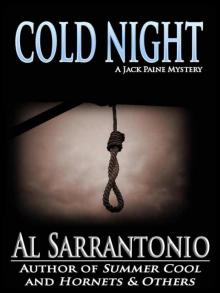 Cold Night (Jack Paine Mysteries)
Cold Night (Jack Paine Mysteries)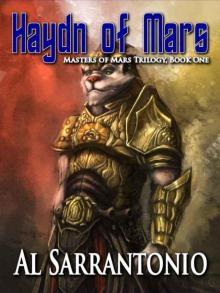 Haydn of Mars
Haydn of Mars Toybox
Toybox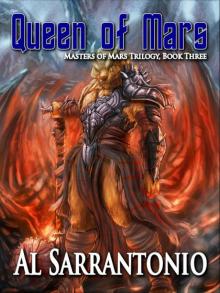 Queen of Mars - Book III in the Masters of Mars Trilogy
Queen of Mars - Book III in the Masters of Mars Trilogy Exile
Exile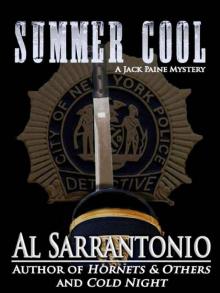 Summer Cool - A Jack Paine Mystery (Jack Paine Mysteries)
Summer Cool - A Jack Paine Mystery (Jack Paine Mysteries)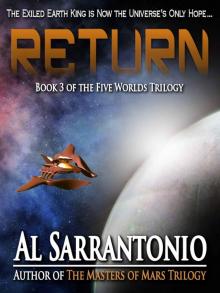 Return - Book III of the Five Worlds Trilogy
Return - Book III of the Five Worlds Trilogy The Orangefield Cycle Omnibus
The Orangefield Cycle Omnibus Summer Cool jp-2
Summer Cool jp-2 The Boy With Penny Eyes
The Boy With Penny Eyes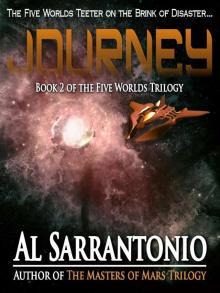 Journey - Book II of the Five Worlds Trilogy
Journey - Book II of the Five Worlds Trilogy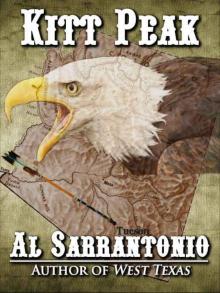 Kitt Peak
Kitt Peak Campbell Wood
Campbell Wood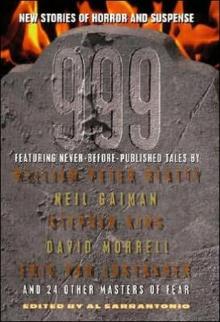 999
999 October
October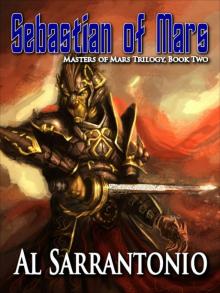 Sebastian of Mars
Sebastian of Mars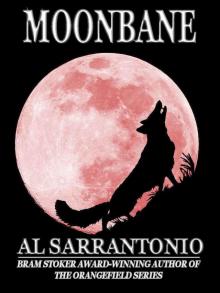 Moonbane
Moonbane Totentanz
Totentanz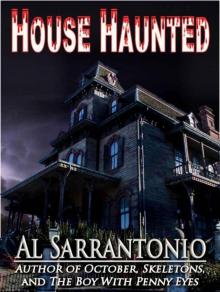 House Haunted
House Haunted Halloweenland
Halloweenland Hornets and Others
Hornets and Others